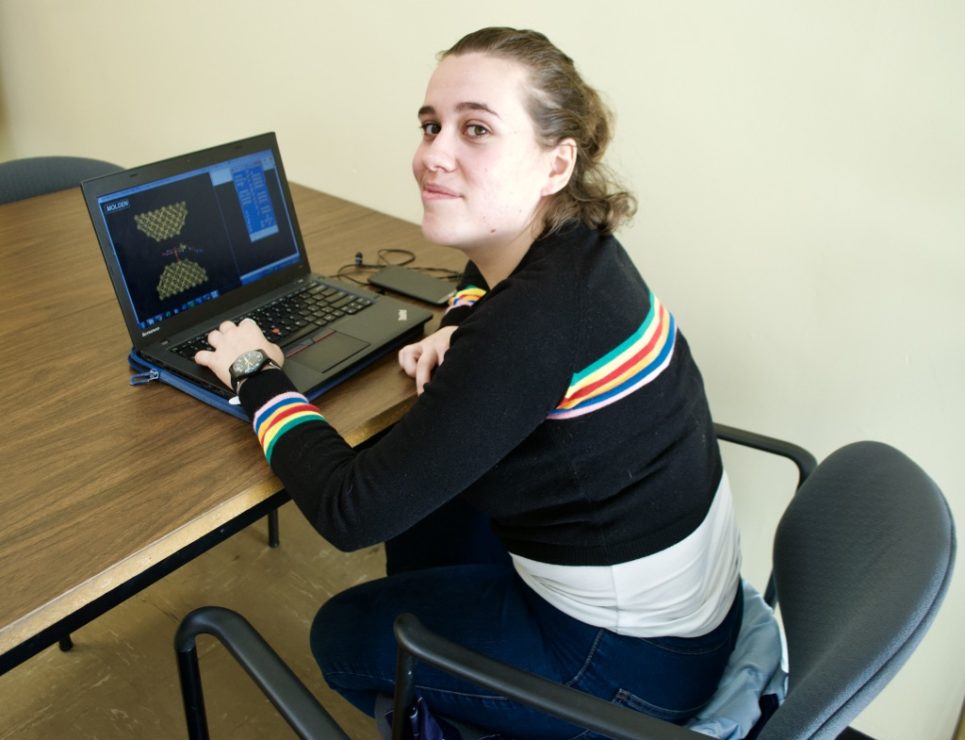
Yarra Hassan was tucked into a stairwell alcove on the third floor of the Elliott Building, poring over her laptop. A third year chemistry major, Hassan has been involved in theoretical chemistry research since her first year, when she nervously approached a professor whom she had heard needed volunteers.
Now, Hassan runs computer simulations of experiments that are conducted in Dr. Irina Paci’s research group to see if theoretical chemistry backs up their real-life results. Her software allows her to look at molecular interactions down to the atom so that she can see what is causing the chemical effects seen in the Paci lab experiments.
Hassan writes computer code designed to portray different atomic interactions, then submits that code to a supercomputer, which runs the simulations. After doing this for a number of slightly different scenarios, like increased temperature or a shift in a molecule’s position, she pieces together the results and compares them with theory-based literature to determine what is happening during the experiment.
Her favourite things about this kind of computer-based research are that she can do it anywhere and that it doesn’t involve any of the lab work that she doesn’t enjoy.
I caught up with Hassan to talk about her start in research and the steep learning curve she faced in the beginning and how she’s improved as a researcher in the two years since.
The Martlet: Why is this an important step in chemistry research?
Hassan: It’s a deeper understanding of it. I think what a lot of people forget about chemistry is that yes, there is the practical part where you go in the lab and mix all the chemicals, but there’s more to it than that. There’s a whole quantum chemistry perspective. I feel like a lot of people don’t realize that simulating it, actually using the theory, is an important part of any experiment.
How have you improved since starting this two years ago?
When I started this, I had to learn how to use Linux, and get used to coding in Python. Getting used to that was a tough thing. It’s been quite a learning curve [but] I feel like I’ve gotten a broader perspective on what is needed in chemistry. In the beginning… I was just doing jobs that [Dr. Paci] gave me and now it’s blossomed into this whole thing where she’s just giving me directions and I’m going off and figuring out how to get there.
Why do you like doing this kind of computational work?
When I first got into chemistry I didn’t know what part of [the field] I wanted to go into. I was doing labs and I was like “I dislike all of this,” and then I found this part and I was like “oh, this is really cool, and I don’t even have to enter a lab to do anything, this is great!” And there’s so much stuff that can be better simulated using computers, so I definitely want to keep on doing stuff like this.
What do you like about doing research?
I love the feeling that you’re at the forefront of helping out the scientific community and discovering new things … In the beginning it wasn’t really self-directed, but now it’s very much self-directed and I love having ownership [of something]. This project was definitely not my idea, but having some part of it is like “yeah, I did this, it’s my work, I can see it and I’m recognized for it.”
Do you think UVic is a good place to do research as an undergraduate?
Yeah, at least for me so far, it’s been great. There’s been a lot of support from the department and a lot of opportunities. I got to go to a conference this summer, completely paid for by the department.
Do you have any advice for undergraduate students wanting to get involved in research?
[I would suggest to] just go up to professors and ask “Do you have a research position I could fill?” or “Could I volunteer for you?” Look at [their] research and see what interests you. Just because they’re a professor doesn’t mean they’re not approachable, and I bet you there’s some professor in your department that needs someone to do something. You can always bounce around a little bit, try different research positions. Maybe you get a research position and in the beginning it doesn’t really interest you, but if you keep at it you’ll find a specific aspect that you find interesting.
This interview has been edited for brevity and clarity.
Are there any exciting research projects on campus you think we should look into? Email edit@martlet.ca!






